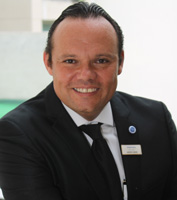Gustavo Jarussi, Regional Operations Manager for the Pestana Group

During one of the sessions of the International Travel Fair (FITCuba) 2015 Caribbean News Digital sat down with Gustavo Jarussi, who is the Regional Manager of Pestana Group. In Cuba this Group manages 4-star All-Inclusive Pestana Cayo Coco Beach Resort Hotel, with 508 rooms, by means of a contract with Cuban Gaviota tourism group.
The Pestana Group handles over 90 units in Portugal and abroad, it features nine thousand rooms in Europe, Africa and Latin America, and employs over seven thousand people. According to US Hotels magazine, the Pestana Group ranks 115th on the list of the main 300 hotel companies around the world.
What’s your responsibility within the company?
Within Pestana as a Group I’m in charge of Caracas, Venezuela, Bogota in Colombia and Cayo Coco in Cuba. I’m responsible for that northern region of South America. When kicked off our operations in Cuba on August 1, 2013. Since the contract was signed in mid-2013, the full year was counted in 2014. The result was very positive and, when we’re about to complete the second year, I can say by analyzing the first four months and the fifth, May, that according to our forecast the result is going to be better than the same period back in 2014.
Have the prospects of Cayo Coco been satisfactory to you?
The prospects are good, destination Cuba is very good, even better after the latest developments. The fact with the keys – it’s very important to pay attention to this element in terms of the opening of new hotels – is that they are going to receive a lot of visitors because of one reason: the opportunity to take practically non-stop flights to the keys with available offers. If we apply simple math, a regular plane has 285 seats, which would represent 3 people per room, so we’re saying that one plane of this size in a destination like Cayo Coco, for example, only accounts for 2 percent of the occupancy. So you need 35 of these airplanes to have 70 percent occupancy. That can be achieved in such markets as Canada, in December, January, through May.
The big challenge for each tour operator and hotel is to increase the number of flights to the destination. Last year we had the opportunity to receive in Cayo Coco the EuroAtlantic flight, operated by Sonhando, along with other operators from Portugal. That flight, for instance, entailed 92 percent of occupancy last year. Even so, that represented 2 percent of the occupancy of the key as a whole. If it would’ve been aimed at one hotel, exclusively, it would be perfect: 18 percent of the hotel’s occupancy. Nevertheless, we all know that customers are the ones to choose where they want to stay.
We’re looking forward to having more people interested in establishing non-stop flights to the keys where their properties are based.
Does the agreement with Sonhando and EuroAtlantic stand this year?
The agreement stands with EuroAtlantic. Sonhando operates the flights of EuroAtlantic, a company in which the Pestana Group has participation, but it’s EuroAtlantic’s merit, embodied by its president, Tomas Metelo, and the Director of Sonhando, Jose Manuel Antunes, as they work and believe in Cuba as a destination. A second operation has been launched this year, in Varadero. Last year there was only one frequency to Cuba and now there are two.
How many rooms do you have in Cuba?
We only have Cayo Coco, with 508 rooms.
Is there any future project in the offing?
Those matters are related to our Development Division, and our CEO Luis Araujo. That piece of information is not ready yet, so we cannot make any announcement on new projects.
What’s your share by selling with your own tour operator and charter in your hotel?
One out of three bookings is made at the hotel. In percentage terms, at the beginning of the operation, since there are other brands in Cuba, which are better positioned than us because of the time they have been on the Island, we believe that the result is positive, taking into account that we haven’t established an exclusive flight for our hotel. We have to be wise enough so as to realize that we’re stepping into a new market and there are important competitors, with strong presence and name, who can boost the charter matter as such. In this sense, we see Cuba as a destination, not only Cayo Coco as Pestana’s hotel.
What’s the importance of gastronomy within the hotel service you provide?
The cuisine occupies a key position as that’s one of the hotel’s strengths with its a la carte service. Since we’re a Portuguese company we can practically say that we’re unique in the gastronomic aspect, not only on the key, but in Cuba. We’re developing negotiations so we can make the most of the cargo space on flights and bring more typical things from Portugal in order to enhance the gastronomic offer, on both the key and the Island.
Who’s your partner on the key?
The hotel is Gaviota’s property.
Colombia and Caracas are part of the structure and your responsibilities. What’s the occupancy of your hotel in Colombia and where do the tourists come from?
The occupancy level in Colombia stands over 60 percent. Colombia is witnessing an incredible development in the hotel industry, as a result of incentive laws applied to that sector, where does who invest in hotel products through 2017 will have 30 years’ grace in terms of taxes.
Many hotel companies are working there, many private hotels, besides the four family hotel groups that were based in Colombia. That situation has brought about a slight decrease in occupancy levels related to daily averages.
Back in 2012, we were happy to be in Bogota, a practically corporate city, with movement from Monday to Thursday. Weekends are all about packages and there is an intense dynamic.
Are you going to invest in beaches in Colombia?
The CEO in charge here, in Cuba, is also assessing other options in Colombia.
You are also responsible for Caracas. Is it corporate?
Caracas is also pure corporate. Caracas’ main customers are Colombians, because of the proximity. They are followed by Brazilians as a result of agreements between Venezuela and Brazil, our name and the ten hotels we operate in Brazil. Then we have Portuguese tourists and lower numbers of visitors from Argentina and Spain, which account for 3 percent. Colombian customers represent 34 percent and Brazilians 13 percent.
On the other hand, it’s quite the contrary in Colombia: Venezuela is the number 1 customer because of the strong relation between both countries. In this case, the Bogota-based hotel benefited from the seven years we’ve spent in Caracas. Brazil is the second market, followed by Argentina and Portugal. They are practically the same markets where our brand is present.
Where is the operation revenue higher?
That’s an interesting question because, if we take dollar as the official currency, we have Caracas with an attractive profitability. The fact is that economically speaking Caracas features some details that other countries don’t.
CADIVI?
Not only CADIVI, there is actually no CADIVI as such. The name is SIMADI and it has some small restrictions, so we haven’t been able to benefit from that new mechanism of capital repatriation.














